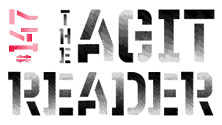
Sparkle in the Rain
A&M, 1984
While in the States Glaswegian band Simple Minds are remembered as an ’80s one-hit wonder for their contribution to the soundtrack for John Hughes’ teen flick classic Breakfast Club, “Don’t You (Forget About Me),” on the other side of the pond they segued that success into grandiose stadium tours and subsequent albums with a grandeur to match. I, like the rest of America, had lost interest by the time their sculpted pop bloated into something else, but then my introduction to the band dated back a little further to this, their seventh, and in my probably not so humble opinion, best album.
As a little research reveals, Simple Minds had evolved from a new wave interpretation of Roxy Music pomp into artful purveyors of majestic rock, not unlike contemporaries U2 in their scope and blurring of the personal and political thematically. For Sparkle in the Rain, they had even recruited Steve Lillywhite, the producer of Bono and company’s first three albums. Lillywhite no doubt had a hand in helping shape this record into the brilliant mix of ambiance and regal songwriting that it is.
Beginning with the thunderous “Up on the Catwalk,” the first thing we here is the beat being counted off before a snare crashes to announce the song. Singer Jim Kerr still has a little Bryan Ferry in his delivery, but singing, “I will be, I will be there,” it’s also hard not to hear a little Bono Vox too. It is on the subsequent track, however, that the band shows some of the grand pop instincts that would lead to their big single as well as a hit album, the forthcoming Once Upon a Time. What makes the song—and the album—stand out is the sense of space it possesses. Its sonic facade seems vast; guitars seem to emerge from a great distance only to recede back within some deep well. And when Kerr calls out, “I couldn’t sleep a wink last night,” over Charles Burchill’s rippling guitar lines on “Speed Your Love to Me,” he seems to be singing from some great precipice.
This collusion of atmosphere and song comes to a head with “Waterfront,” the album’s centerpiece. The song begins with a throbbing bassline that gives way to soft drum explosions and a wailing of guitars. Michael MacNeil’s keyboards are at once otherworldly and organic, like the groan of some great intergalactic glacier. Kerr barely has to say a word so that when he commands, “Come in, come out of the rain,” it somehow seems poignant. This is clearly one for the ages.
With the late Kirsty MacColl lending her vocals (she was married to Lillywhite at the time), Simple Minds even make Lou Reed’s “Street Hassle” sound more tender than smarmy. “‘C’ Moon Cry Like a Baby” is similarly undercut with a sensitivity that belies its grand refrains. With “The Kick Inside of Me” and “Shake Off the Ghosts” making the shift between up-tempo anthem and instrumental retreat, the album ends with its two sides shown vividly. This mix between the bold and the beatific is what makes Sparkle in the Rain still sound striking and that proves that Simple Minds were much more than most remember.
Stephen Slaybaugh
PAST PERFECTS
Blank Dogs, Collected By Itself: 2006-2009
The Kinks, Kinks, Kinda Kinks and The Kink Kontroversy
The Zeros, "Main Street Brat" and The Normals, "Almost Ready"
Pearl Jam, Vs. and Vitalogy
Swearing at Motorists, Postcards from a Drinking Town
Talk Talk, Spirit of Eden
Disco Love 2: More Rare Disco & Soul Uncovered
Nick Lowe, Labour of Lust
Queens of the Stone Age, Queens of the Stone Age
Human Switchboard, Who’s in My Hangar?
Johnny Cash, From Memphis to Hollywood: Bootleg Vol. 2
Miles Davis, Bitches Brew Live
The Witches, A Haunted Person's Guide to...
Fela Kuti, "Power Show" Batch, Part II
